Newsgathering
Hey! You Defamed Me (By Not Saying Anything About Me)!
DOJ's Public Statements Provide a Road Map for Citizens to Sue in Cop Recording Cases
The 'Mugshot Racket' II: A Commercial Purpose Exemption?
The Danger of Secret Legal Memos and an Unchecked Executive
Copyright 2007-24 Digital Media Law Project and respective authors. Except where otherwise noted,
content on this site is licensed under a Creative Commons Attribution-Noncommercial-ShareAlike 3.0 License: Details.
Use of this site is pursuant to our Terms of Use and Privacy Notice.
content on this site is licensed under a Creative Commons Attribution-Noncommercial-ShareAlike 3.0 License: Details.
Use of this site is pursuant to our Terms of Use and Privacy Notice.


 Another day. Another "I created Facebook first" case.
Another day. Another "I created Facebook first" case.
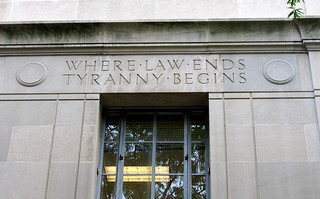 In May 2010, Christopher Sharp used his cell phone to record video of his friend being arrested by the Baltimore Police at the Preakness Stakes. The police demanded that Sharp surrender his phone, stating that the contents might be evidence; when the phone was returned, Sharp discovered that the video he had made, plus a number of other unrelated videos, had been deleted.
In May 2010, Christopher Sharp used his cell phone to record video of his friend being arrested by the Baltimore Police at the Preakness Stakes. The police demanded that Sharp surrender his phone, stating that the contents might be evidence; when the phone was returned, Sharp discovered that the video he had made, plus a number of other unrelated videos, had been deleted. When
When 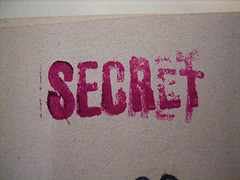 Shortly after the Obama Administration
Shortly after the Obama Administration  Perhaps it’s the nightly lobster tails and
Perhaps it’s the nightly lobster tails and  Give the Obama Administration credit for trying.
Give the Obama Administration credit for trying. Kansas City Star reporter Alan Bavley had a hunch. After years of investigating the health care industry, Bavley began to suspect that state medical boards did not adequately discipline doctors who committed malpractice. Physicians battling substance abuse, for example, were punished far more harshly.
Kansas City Star reporter Alan Bavley had a hunch. After years of investigating the health care industry, Bavley began to suspect that state medical boards did not adequately discipline doctors who committed malpractice. Physicians battling substance abuse, for example, were punished far more harshly.
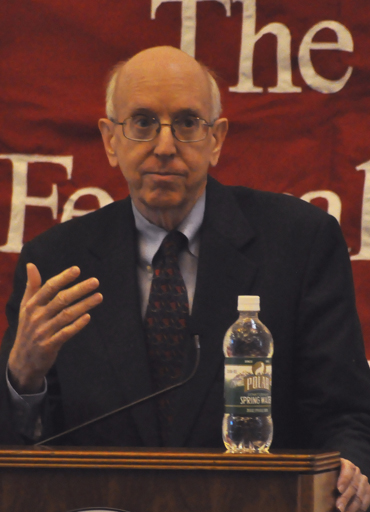 In what is now their
In what is now their 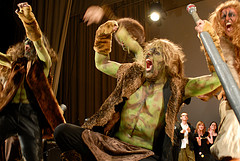 It’s been
It’s been 
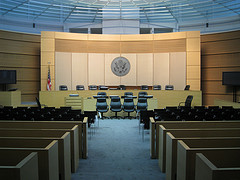 The
The 
Description:
On September 1, 2011, Johns-Byrne Company filed a Rule 224 action in Illinois state court. Rule 224 allows a party to conduct limited discovery, before filing a lawsuit, in order to determine the identity of the party that allegedly caused the plaintiff's damages.
The action was based on an August 17, 2011 post on the tech-news site TechnoBuffalo. The post contained photographs of and information about an upcoming Motorola smartphone. Johns-Byrne's petition for discovery stated that the company had been involved in printing promotional material for Motorola, and that the images recieved and posted by TechnoBuffalo were of this promotional material. Johns-Byrne alleged that the photos disclosed a trade secret, and stated that the party that took the photos and sent them to TechnoBuffalo "may have been" a Johns-Byrne employee.
Johns-Byrne's petition sought discovery from TechnoBuffalo and its web-host Media Temple, as well as from Google (TechnoBuffalo's email service) and AT&T (because Johns-Byrne had reason to believe that the photos were taken with an iPhone and possibly sent over AT&T's network). Johns-Byrne hoped to discover the identity of the party that took and sent the pictures.
Court documents stated that Media Temple, Google, and AT&T all "agreed to comply" with the discovery request. On September 26, though, TechnoBuffalo opposed Johns-Byrne's petition. TechnoBuffalo asserted reporter's privilege, both under California law (where TechnoBuffalo is based) and under Illinois law (where Johns-Byrne is based, and where the discovery action was filed). TechnoBuffalo argued that under either state's law, it was protected from attempts to reveal the identity of a confidential source.
On October 17, Johns-Byrne responded to TechnoBuffalo's opposition. Johns-Byrne argued that Illinois, not California, law should apply, and that TechnoBuffalo's content did not qualify as "news." Instead, Johns-Byrne argued, TechnoBuffalo's coverage of technology "was nothing more than commercial hype intended to excite the blog's followers." Thus, TechnoBuffalo failed to "rise to the level of legitimate journalism."
On November 7, TechnoBuffalo filed a reply brief. TechnoBuffalo relied on O'Grady v. Superior Court, a 2006 California state court case in which two tech news websites successfully invoked California's reporter's privilege, and Mortgage Specialists v. Implode-Explode Heavy Industries, a 2010 New Hampshire case which ruled that a website could claim the state's newsgathering privilege. TechnoBuffalo also argued that Too Much Media v. Hale, among other cases cited by Johns-Byrne, was inapposite. In Hale, a New Jersey court ruled that a message-board poster could not invoke the state's shield law. TechnoBuffalo pointed to the Hale court's distinction between a "news-oriented website" and someone who "randomly comments" on public forums.
On January 13, 2012, the Cook County Judge granted Johns-Byrne's petition for discovery. The judge used Illinois law to rule that TechnoBuffalo's reliance on the reporter's privilege was "misplaced." The judge stated that TechnoBuffalo's site "did not encourage a well-informed citizenry," and that the "anonymous 'tipster' is hardly an example of a 'source' of investigative journalism" deserving of protection. Thus, Johns-Byrne could begin discovery.
UPDATE:
On July 13, 2012, the Cook County Judge granted TechnoBuffalo's Motion to Reconsider, thereby denying John Byrne's Rule 224 petition for discovery. According to the court, "TechnoBuffalo is a news medium, its employees are reporters ... and TechnoBuffalo is protected by the Illinois reporter's privilege."